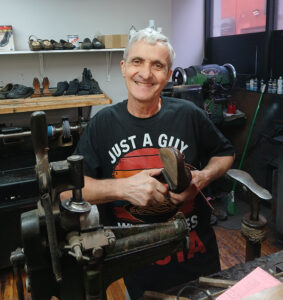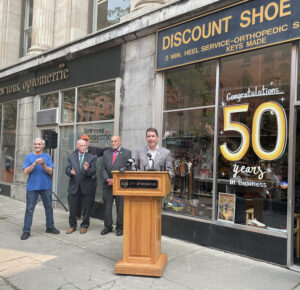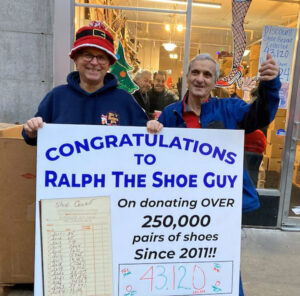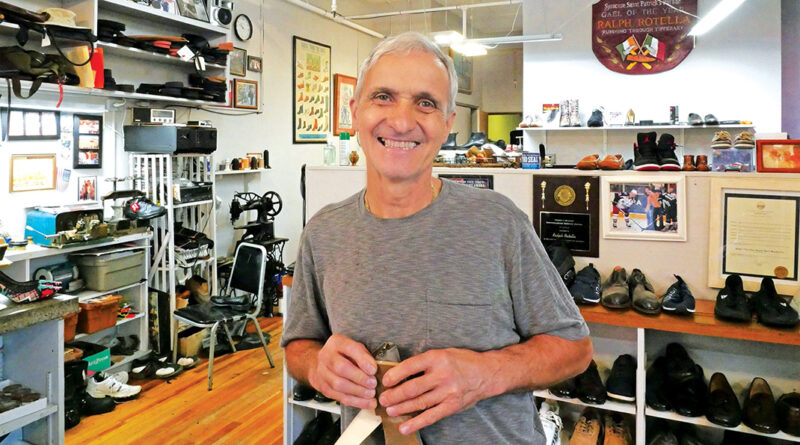‘Ralph the Shoe Guy’ Celebrates 50 Years in Syracuse
Ralph Rotella celebrates half a century at Discount Shoe Repair in downtown Syracuse; the shoe drive he started in 2011 has brought in more than 250,000 pairs of shoes, which are donated to the needy
By Tim Bennett
“A good name is rather to be chosen than great riches and loving favor than silver and gold.”

If there is one man in Central New York who epitomizes the above saying, it is Ralph Rotella.
An Italian immigrant to Syracuse at 16 with his family over five decades ago, Rotella has worked repairing shoes ever since — first for another owner and then as a partner with his uncle in 1975 when they opened their own shop, Discount Shoe Repair, on 114 E. Washington St. in downtown Syracuse. Rotella has been the sole proprietor since his uncle died 15 years ago and at 71 shows no signs of slowing down.
To many Syracusans, Rotella is not only a skilled craftsman capable of rescuing their favorite footwear from the ash heap; he is also their icon of hope, perseverance and good-natured generosity toward their community.
Syracuse Mayor Ben Walsh and Onondaga County Executive Ryan McMahon II were so impressed by Rotella’s efforts to help those around him, they both officially proclaimed days in his honor. The first was in 2022 when the mayor officially declared Dec. 14 to be “Ralph, ‘The Shoe Repair Man,’ Rotella Day.” The second was the following year when the county executive made Dec. 14, 2023, “Ralph Rotella Day.”

A third honor came recently when Walsh showed up on the sidewalk at the shop and presented Rotella publicly with a plaque proclaiming June 3, 2025, “Discount Shoe Repair Day in Syracuse” for his 50th year serving the city. Walsh is quoted as saying that when he is with Ralph, he is just Ben, because “Ralph is the true mayor of Syracuse who puts a shine on the city every day.”
If that acclaim was not enough, local filmmakers Francis DiClemente and Shane Johnson directed a documentary about Rotella titled, “Ralph Rotella: The Sole of Syracuse,” which won first place for Best Director of Short Films, from the New York Documentary Film Awards in 2024. [The documentary is accessible on YouTube using the title, “Ralph Rotella: The Sole of Syracuse.”]
For Rotella, this city recognition all began on a cold, snowy January day in 2011.
It was slow in the shop and he was looking out the front window when he saw a man shuffling by who had toes sticking out of his shoes. He thought to himself, what a shame, and immediately went outside to pursue the man. Rotella then coaxed him into the shop and invited him to sit down.
“What size shoe do you wear?” he asked. When the man responded, “I dunno,” Rotella looked at his feet and said, “Size 10, right?
Without another word, Rotella found a pair of size 10 boots in the shop and had the man try them on. “They fit like a glove,” Rotella said. The man left without a thank you. But a seed was sown in Rotella’s heart: There were probably many others like him who need a good pair of shoes. Hence a shoe drive for the Rescue Mission was born. The first year only yielded 35 pairs of shoes to give away but soon many others in the community joined forces, like radio personality “Big Mike” from Sunny 102.1 and the donations turned into hundreds and then thousands.
As of today, Rotella’s annual shoe drive over the years has brought in more than 250,000 pairs of shoes. Rotella said what shoes don’t go to residents at the Rescue Mission go into the Rescue Mission’s thrift store, which helps to fund the organization. The Rescue Mission awarded Rotella with the Community of Hope Award in 2023.
When I talked with him at his shop recently, I understood why he was such a beloved figure in the community — he welcomed me like a friend, had a sense of humor, spoke from the heart and was a man of obvious integrity.

Q. Tell me about coming to the United States from Italy.
A. My grandfather and grandmother were here before us a couple of years earlier. We were from Calabria, which is like one of the states in America. It’s in southern Italy. Over 50 years ago there weren’t many jobs in our area. The jobs were in the north. So, as a family, we were struggling a little bit so my grandparents said, “Why don’t you join us in America?” Back then you had to fill out a lot of papers and you needed a sponsor who had a job, so my grandfather was our sponsor.
Q. When did you arrive in New York and did you know any English at the time?
A. We arrived in the U.S. Oct. 1, 1970, in New York when I was 16. I only knew two sentences in English at the time: “You’re beautiful. Give me a kiss.”
Q. That’s funny. Was it hard adjusting to America?
A. The first thing that really shocked me was all the snow and the houses. It really surprised me that the houses were made out of wood, not concrete. Places like that in Italy were for camping. So I asked my grandparents, “When are we going to your house?” When they said, “This is our house,” I was amazed because our houses over there were nothing like that.
Q. So I assume you probably went to public school? What was that like?
A. Actually, it was only for a couple of months because I had to work to help my family. I went to night school at what they called the Prescott School.
Q. Where did you work?
A. With my uncle at a shoe shop on Fayette Street. We worked for somebody else. The owner was nice and everything but we worked so hard we wanted our own shop. So, after five years we opened up at this location in 1975. We just celebrated 50 years last Tuesday [June 3].
Q. That is quite an achievement. So you worked for your uncle?
A. No. We worked together as equal partners.
Q. How long did you share the business?
A. We worked together until he passed away 15 years ago. He was 70; too much smoking. Too bad. He was young.
Q. Were there any other things that were hard for you in the beginning, so far from home?
A. Well, at first, it was hard because in Italy everybody says “Hi, how are you?” on the streets and even invite you in for a cup of coffee in the morning, or a gelato in the evening, but not here. I got used to it after a couple of years. Nothing bothers me now. I got people dropping in to see me all the time and they ask me how I’m doing. I’ve got nothing to complain about. You work hard here you can go a long way. I’ve got a beautiful house. I’ve got a beautiful business, a nice wife, a nice son and my two cars are paid for. I work hard every day — sometimes seven days a week. Usually, it is only five days, but this week I’ve got a lot of work so I will go home, eat and come back.
Q. Do you think you will sell the business?
A. No. I don’t think so. I’m kind of like the “last of the Mohicans.” Nobody wants to get their hands dirty anymore. But who knows? I think I got another five or six years, maybe. If I can sell it to someone I would probably try to help out part-time. But I will cross that bridge when I get there. I’m still young yet.
Q. What kind of clientele do you get for your business?
A. I get people from all backgrounds. But I have five times more women clients than men. Same with the shoe drive, more women shoes come in than men’s shoes. All the mayors of Syracuse have come to my shop. People from all over the area come — even from Utica, Herkimer, Buffalo and Rochester. I even had the secretary of Paul Stanley, the singer for that group Kiss, come in so I could repair his platform shoes many years ago. I also repaired the zipper on a leather skirt for the singer Cher. We get all kinds of people dropping by.
Q. So, have you talked with Mayor Walsh about not moving the Columbus monument?
A. Oh, no. I don’t talk politics but they shouldn’t move it. A lot of Italians gave money for that. But if they want to move it they can bring it over and put it in front of my store, I don’t care. There is a little park over there. Or, they can put it in my backyard.
Q. How many shoes do you repair a day?
A. Depends on the day. Could be 20, 30, 10. I got a guy who is getting married and he gave me a box of 10 shoes (pointed to a box filled with black shoes on the floor) and he doesn’t know which pair to wear. So, I will clean them all up and he can pick the ones he wants to wear for his wedding.
Q. How did you meet your wife?
A. I met her many years ago. She came in to get some shoes repaired and I thought she was very beautiful. It took a couple of years to win her over because she had a boyfriend. She was American born. Her parents came from Italy.
Q. Did she know Italian?
A. A few words. The worst ones.
Q. So your romance was in English? She didn’t mind a man with few words?
A. No, as long as I could say “Give me a kiss” and “You’re beautiful.” It didn’t take long to learn and talk in English — though I still speak with a broken accent. But people like the way I speak.
Q. What do you like to do when you are not working?
A. I like to work in my vegetable garden. I’ve got tomatoes, cucumbers, basil, oregano, peppers, sweet peas and pole beans that grow up to the ceiling.
Q. So your garden is as big as your shop?
A. Oh, bigger.
Q. How about in the winter? What do you like to do?
A. I shovel the snow (laughs). Oh, hockey. We sponsor the Syracuse Crunch. I’ve had season tickets for 20 years and I help out with the boosters club. I also walk around the arena and sell the 50-50 raffle tickets. They like the fact that everybody knows me.
Q. So you’re like a local celebrity and they use you to sell their products?
A. Oh, yeah. I don’t mind. People recognize me everywhere I go. If I go to Wegmans I hear all the time, “Hey Ralph, we’ve got some shoes for you!” You wouldn’t believe how many times people drop off shoes at my house in Liverpool. Many years ago me and my wife were in Nantucket Island and I hear “Ralph! Ralph! What are you doing over here?” I turn around and it’s the guy who used to work in this building who moved there from Syracuse. No matter where I go people know me.
Q. What was it about shoe repair that attracted you to it?
A. I just liked fixing shoes. It was something different and I like meeting people. I guess it didn’t hurt there were a lot of pretty ladies coming into the store. I also didn’t have to go to college to learn to do it. In the old country, I did a lot of different jobs — tailoring, changing tires on cars, working carpentry.
Q. What was the hardest thing you had to repair?
A. Last year a guy brought me a pair of ice skates that had belonged to his father and he wanted me to take off the blades and make them into shoes. I said I didn’t know how they would turn out and he said, “It doesn’t matter because I am not going to wear them. I just want them made into shoes so I can put them on display.” I did such a beautiful job he was so happy. It took me half a day to do it and it cost him a chunk of money, but he was very happy. If somebody brings me in something beyond repair I just smile and say, “Listen, I’m a shoe repairman, not a magician.”

